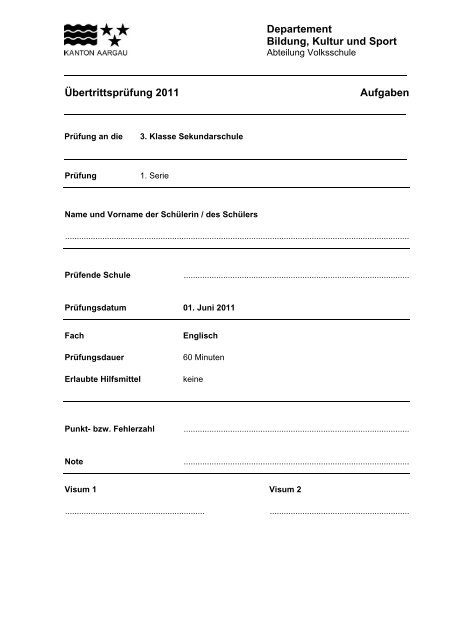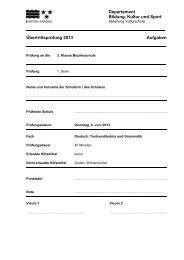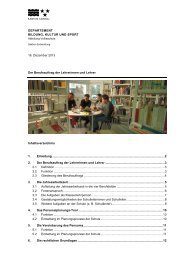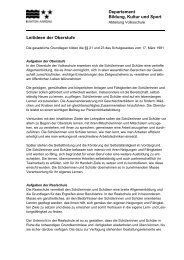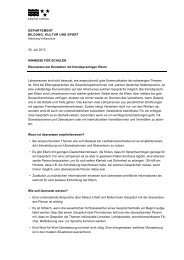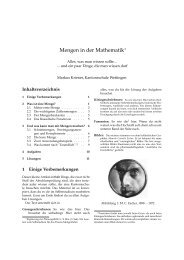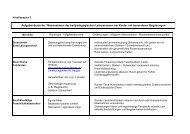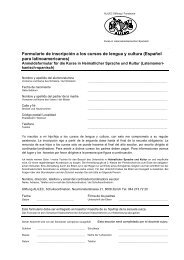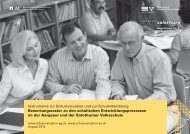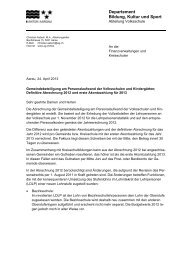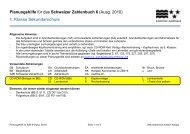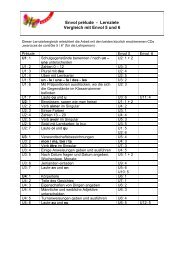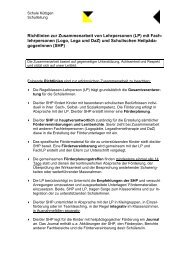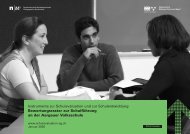Übertrittsprüfung 2011 Englisch
Übertrittsprüfung 2011 Englisch
Übertrittsprüfung 2011 Englisch
You also want an ePaper? Increase the reach of your titles
YUMPU automatically turns print PDFs into web optimized ePapers that Google loves.
Departement<br />
Bildung, Kultur und Sport<br />
Abteilung Volksschule<br />
Übertrittsprüfung <strong>2011</strong><br />
Aufgaben<br />
Prüfung an die<br />
3. Klasse Sekundarschule<br />
Prüfung<br />
1. Serie<br />
Name und Vorname der Schülerin / des Schülers<br />
....................................................................................................................................................<br />
Prüfende Schule .................................................................................................<br />
Prüfungsdatum 01. Juni <strong>2011</strong><br />
Fach<br />
Prüfungsdauer<br />
Erlaubte Hilfsmittel<br />
<strong>Englisch</strong><br />
60 Minuten<br />
keine<br />
Punkt- bzw. Fehlerzahl .................................................................................................<br />
Note .................................................................................................<br />
Visum 1 Visum 2<br />
............................................................ ............................................................
<strong>Englisch</strong> / 3. Klasse Sekundarschule<br />
1. Serie<br />
1. Listening comprehension<br />
Die anwesende Lehrperson wird dir einen kurzen Text vorlesen. Danach wirst du Zeit haben,<br />
die Fragen und Antworten durchzugehen. Anschliessend wird dir der Text noch einmal<br />
vorgelesen.<br />
in London,<br />
in London.<br />
Tom lives in in Reading, but his parents live in in Reading.<br />
in Manchester,<br />
in Manchester.<br />
in a hospital,<br />
in a hospital.<br />
His mother works in a bank, but his father works in a bank.<br />
in a hotel,<br />
in a hotel.<br />
in a hospital,<br />
Tom would like to work in a bank,<br />
in a hotel,<br />
in a hospital.<br />
but he works in a bank.<br />
in a hotel.<br />
Russian,<br />
Spanish.<br />
Tom speaks German, but he doesn’t speak French.<br />
Spanish,<br />
Italian.<br />
His e-mail address is<br />
tom7905@nonstop.uk.<br />
tom7095@nonstop.uk.<br />
tom7950@nonstop.uk.<br />
He would like to come to Switzerland<br />
but it’s too expensive.<br />
and the fare is no problem for him.<br />
because it’s not expensive.<br />
Pro richtige Antwort 1 Punkt<br />
Total 10 Punkte<br />
2. Complete the sentences with a, an or the.<br />
Vervollständige die Sätze mit a, an oder the.<br />
Example: Do you have ___a____ television at home?<br />
London is _____ capital of England. It’s ___ very big city.<br />
My sister isn’t __ English teacher. She is ___ French teacher.<br />
What’s ____ name of this song? I think, it’s ___ nice song, but my father<br />
thinks, it’s ___ awful song.<br />
Aufgaben 2/7
<strong>Englisch</strong> / 3. Klasse Sekundarschule<br />
1. Serie<br />
Do you always use ___ dictionary in school?<br />
I never eat ___ apple for dinner, but I always eat ___ orange for dinner.<br />
Pro richtige Form ½ Punkt<br />
(Rechtschreibung zählt)<br />
Total 5 Punkte<br />
3. Verben - Verbs<br />
Fill in the gaps. Fülle die Lücken aus.<br />
Example: eat We __eat___ a lot of bread in the morning.<br />
work<br />
He ________ as a teacher.<br />
fly She never _________ .<br />
do<br />
go<br />
can<br />
sit<br />
do<br />
can<br />
go<br />
be<br />
come<br />
work<br />
finish<br />
Have<br />
I always ____ my homework in school.<br />
Does he usually ____ to work by train?<br />
No, she ________ speak French, it’s too difficult for her.<br />
Yes, he always ______ on the same chair.<br />
My brother? No, he never _______ his homework in school.<br />
They _______ speak Italian, they are Italian.<br />
His sister never _______ to the cinema.<br />
We ________ French, we live in Paris.<br />
Where does he _______ from?<br />
No, they don’t ______ there.<br />
She never _________ work before two o’clock.<br />
My father ______ got a blue car.<br />
Pro richtige Form ½ Punkt<br />
Total 7 Punkte<br />
(Rechtschreibung zählt)<br />
Aufgaben 3/7
<strong>Englisch</strong> / 3. Klasse Sekundarschule<br />
1. Serie<br />
4. Singular and Plural<br />
a pot of tea two _______________ a lady ten ______________<br />
a man three ______________ an address five ______________<br />
a curtain many ______________ a dictionary six _______________<br />
a watch four _______________ a child many _____________<br />
a woman seven ______________ a glass many _____________<br />
Pro richtige Antwort ½ Punkt<br />
(Rechtschreibung zählt)<br />
Total 5 Punkte<br />
5. What’s the opposite?<br />
Was ist das Gegenteil?<br />
Example: long __short__<br />
buy __________________ teach ___________________<br />
carelessly __________________ warm ___________________<br />
start<br />
__________________ expensive ___________________<br />
poor __________________ badly ___________________<br />
always __________________ easy ___________________<br />
Pro richtige Antwort ½ Punkt<br />
(Rechtschreibung zählt)<br />
Total 5 Punkte<br />
6. Present continuous or simple present?<br />
Write sentences using the correct time. Bilde Sätze in der richtigen Form.<br />
Example:<br />
He __speaks__ English and Italian. (speak)<br />
Not now! I ___________________ my homework. (do)<br />
Open the door! I ___________________ a shower. (have)<br />
It’s a lovely day today – the sun ___________________ . (shine)<br />
Aufgaben 4/7
<strong>Englisch</strong> / 3. Klasse Sekundarschule<br />
1. Serie<br />
My mother usually ______________________ (drink) mineral water, but today<br />
she ________________________ (drink) tea.<br />
Peter never ________________________ (read) a book.<br />
Pro richtige Antwort 1 Punkt<br />
(Rechtschreibung zählt)<br />
Total 6 Punkte<br />
7. Write these words in the correct order to make sentences.<br />
Ordne die Sätze neu, um richtige Sätze zu erstellen.<br />
Example: her/ name/ what’s/ father’s/ ? _What’s her father’s name_ ?<br />
in / meat / parents / eat / the / never / my / evening / .<br />
______________________________________________________________<br />
do / usually / what / on / you / morning / Sunday / do / ?<br />
______________________________________________________________<br />
morning / church / go / usually / Sunday / we / to / on / .<br />
______________________________________________________________<br />
disco / I / the / never / at / see / them / .<br />
______________________________________________________________<br />
old / years / thirty-four / is / he / .<br />
______________________________________________________________<br />
Pro richtige Antwort 1 Punkt<br />
(Rechtschreibung zählt)<br />
Total 5 Punkte<br />
Aufgaben 5/7
<strong>Englisch</strong> / 3. Klasse Sekundarschule<br />
1. Serie<br />
8. What are the questions to the following answers?<br />
Was sind die Fragen zu den folgenden Antworten?<br />
Example:<br />
__Can I come in?___ / Yes, you can come in.<br />
___________________ drinking ? / He’s drinking a coke.<br />
___________________ their books? / They are at school.<br />
___________________ your name? / My name is William.<br />
___________________ Kate? / She’s his wife.<br />
___________________ a house? / No, they haven’t.<br />
___________________ the fare? / It’s £5.<br />
___________________ go to? / I go to London.<br />
Pro richtige Antwort 1 Punkt<br />
(Rechtschreibung zählt)<br />
Total 7 Punkte<br />
10. Reading comprehension<br />
Lucy and Emily are two sisters from Frimley Green who work in St. Thomas<br />
Hospital in London. They usually go to work by train, but sometimes they use<br />
their father’s car to get there. They never use their mother’s car.<br />
Their father works as a receptionist at a hotel near Heathrow Airport. He often<br />
works on Saturday and Sunday, Lucy and Emily too. That’s why their mother,<br />
who works as a teacher in Basingstoke, is sometimes alone on the weekend.<br />
For lunch, Lucy and Emily often go to Piccadilly Circus, a place in the center of<br />
London, to eat their sandwiches. They can’t always go there, because they<br />
sometimes don’t have enough (genug) time to go there.<br />
They like movies very much and they would like to go to the cinema in London,<br />
but it is too expensive for them.<br />
Aufgaben 6/7
<strong>Englisch</strong> / 3. Klasse Sekundarschule<br />
1. Serie<br />
True, false, don’t know:<br />
True False Don’t know<br />
Lucy doesn’t know Emily. <br />
Emily lives in London. <br />
Lucy and Emily have got a car. <br />
Their mother has got a car. <br />
Their father works at Heathrow Airport. <br />
Lucy and Emily never work on Saturdays. <br />
Lucy and Emily always eat their Lunch at<br />
Picadilly Circus. <br />
Their mother is sometimes alone on the<br />
weekend, because she is a teacher. <br />
Their mother lives in Basingstoke. <br />
Lucy and Emily often go the cinema in<br />
London. <br />
Pro richtige Antwort 1 Punkt<br />
Total 10 Punkte<br />
Aufgaben 7/7
<strong>Englisch</strong> Aufnahmeprüfung <strong>2011</strong><br />
Sekundarschule 3. Klasse<br />
Der vorliegende Text wird den Schülern zunächst einmal langsam<br />
vorgesprochen (bitte kurzen Halt nach jedem Block). Danach haben die Schüler<br />
Zeit, ihre Antworten einzusetzen. Anschliessend wird der Text noch einmal<br />
langsam vorgesprochen (bitte wieder mit kurzen Stopps nach jedem Block).<br />
Text listening comprehension<br />
Tom is a young British Man and a supporter of Manchester United. No, he doesn’t<br />
live in London but his parents live there. Tom lives in a city near London called<br />
Reading.<br />
His mother works in a bank near a big hospital where his father works. Tom works in<br />
a bank, but he would like to work in a hotel because he likes to speak different<br />
languages. He doesn’t speak Russian and Spanish, but he speaks German, French<br />
and Italian very well.<br />
He would like to travel to Switzerland. He knows, that Switzerland is very expensive,<br />
but he has got a lot of money to spend.<br />
You would like to write to Tom? Well, his e-mail address is tom7095@nonstop.uk.<br />
Text Listening Comprehension<br />
<strong>Englisch</strong> Aufnahmeprüfung 3. Sek. <strong>2011</strong> 1. Serie
Departement<br />
Bildung, Kultur und Sport<br />
Abteilung Volksschule<br />
Übertrittsprüfung <strong>2011</strong><br />
Lösungen<br />
Prüfung an die<br />
3. Klasse Sekundarschule<br />
Prüfung<br />
1. Serie<br />
Fach<br />
Prüfungsdauer<br />
<strong>Englisch</strong><br />
60 Minuten<br />
Erlaubte Hilfsmittel<br />
keine
<strong>Englisch</strong> / 3. Klasse Sekundarschule<br />
1. Serie<br />
1. Listening comprehension<br />
Die anwesende Lehrperson wird dir einen kurzen Text vorlesen. Danach wirst du Zeit haben,<br />
die Fragen und Antworten durchzugehen. Anschliessend wird dir der Text noch einmal<br />
vorgelesen.<br />
in London,<br />
X in London.<br />
Tom lives in X in Reading, but his parents live in in Reading.<br />
in Manchester,<br />
in Manchester.<br />
in a hospital,<br />
X in a hospital.<br />
His mother works X in a bank, but his father works in a bank.<br />
in a hotel,<br />
in a hotel.<br />
in a hospital,<br />
Tom would like to work in a bank,<br />
X in a hotel,<br />
in a hospital.<br />
but he works X in a bank.<br />
in a hotel.<br />
Russian,<br />
X Spanish.<br />
Tom speaks X German, but he doesn’t speak French.<br />
Spanish,<br />
Italian.<br />
His e-mail address is<br />
tom7905@nonstop.uk.<br />
X tom7095@nonstop.uk.<br />
tom7950@nonstop.uk.<br />
He would like to come to Switzerland<br />
but it’s too expensive.<br />
X and the fare is no problem for him.<br />
because it’s not expensive.<br />
Pro richtige Antwort 1 Punkt<br />
Total 10 Punkte<br />
2. Complete the sentences with a, an or the.<br />
Vervollständige die Sätze mit a, an oder the.<br />
Example: Do you have ___a____ television at home?<br />
London is _the_ capital of England. It’s _a_ very big city.<br />
My sister isn’t _an_ English teacher. She is _a_ French teacher.<br />
What’s _the_ name of this song? I think, it’s _a_ nice song, but my father<br />
thinks, it’s _an_ awful song.<br />
Lösungen 2/7
<strong>Englisch</strong> / 3. Klasse Sekundarschule<br />
1. Serie<br />
Do you always use _a__ dictionary in school?<br />
I never eat _an__ apple for dinner, but I always eat _an__ orange for dinner.<br />
Pro richtige Form ½ Punkt<br />
(Rechtschreibung zählt)<br />
Total 5 Punkte<br />
3. Verben - Verbs<br />
Fill in the gaps. Fülle die Lücken aus.<br />
Example: eat We __eat___ a lot of bread in the morning.<br />
work<br />
He _works____ as a teacher.<br />
fly She never _flies________ .<br />
do<br />
go<br />
can<br />
sit<br />
do<br />
can<br />
go<br />
be<br />
come<br />
work<br />
finish<br />
have<br />
I always _do__ my homework in school.<br />
Does he usually _go_ to work by train?<br />
No, she _can’t___ speak French, it’s too difficult for her.<br />
Yes, he always _sits___ on the same chair.<br />
My brother? No, he never __does_____ his homework in school.<br />
They _can__ speak Italian, they are Italian.<br />
His sister never __goes__ to the cinema.<br />
We __are___ French, we live in Paris.<br />
Where does he _come__ from?<br />
No, they don’t _work_ there.<br />
She never __finishes__ work before two o’clock.<br />
My father _has__ got a blue car.<br />
Pro richtige Form ½ Punkt<br />
(Rechtschreibung zählt)<br />
Total 7 Punkte<br />
Lösungen 3/7
<strong>Englisch</strong> / 3. Klasse Sekundarschule<br />
1. Serie<br />
4. Singular and Plural<br />
a pot of tea two _pots of tea______ a lady ten __ladies_______<br />
a man three __men_________ an address five __addresses___<br />
a curtain many __curtains______ a dictionary six __dictionaries__<br />
a watch four ___watches_____ a child many _children _____<br />
a woman seven __women______ a glass many _glasses _____<br />
Pro richtige Antwort ½ Punkt<br />
(Rechtschreibung zählt)<br />
Total 5 Punkte<br />
5. What’s the opposite?<br />
Was ist das Gegenteil?<br />
Example: long __short__<br />
buy ____sell____________ teach ____learn___________<br />
carelessly ____carefully________ warm ____cold____________<br />
start ____end / finish______ expensive ____cheap__________<br />
poor ____rich____________ badly ____well____________<br />
always ____never__________ easy ____difficult ________<br />
Pro richtige Antwort ½ Punkt<br />
(Rechtschreibung zählt)<br />
Total 5 Punkte<br />
6. Present continuous or simple present?<br />
Write sentences using the correct time. Bilde Sätze in der richtigen Form.<br />
Example:<br />
He __speaks__ English and Italian. (speak)<br />
Not now! I ___’m (am) doing______ my homework. (do)<br />
Open the door! I __’m (am) having_____ a shower. (have)<br />
It’s a lovely day today – the sun __’s (is) shining__________ . (shine)<br />
Lösungen 4/7
<strong>Englisch</strong> / 3. Klasse Sekundarschule<br />
1. Serie<br />
My mother usually ___drinks_________ (drink) mineral water, but today she<br />
___ ‘s (is) drinking___________ (drink) tea.<br />
Peter never __reads________ (read) a book.<br />
Pro richtige Antwort 1 Punkt<br />
(Rechtschreibung zählt)<br />
Total 6 Punkte<br />
7. Write these words in the correct order to make sentences.<br />
Ordne die Sätze neu, um richtige Sätze zu erstellen.<br />
Example: her/ name/ what’s/ father’s/ ? _What’s her father’s name_ ?<br />
in / meat / parents / eat / the / never / my / evening / .<br />
_My parents never eat meat in the evening ._________________________<br />
do / usually / what / on / you / morning / Sunday / do / ?<br />
_What do you usually do on Sunday morning?_______________________<br />
morning / church / go / usually / Sunday / we / to / on / .<br />
_We usually go to church on Sunday morning._______________________<br />
disco / I / the / never / at / see / them / .<br />
_I never see them at the disco.____________________________________<br />
old / years / thirty-four / is / he / .<br />
_He is thirty-four years old._______________________________________<br />
Pro richtige Antwort 1 Punkt<br />
(Rechtschreibung zählt)<br />
Total 5 Punkte<br />
Lösungen 5/7
<strong>Englisch</strong> / 3. Klasse Sekundarschule<br />
1. Serie<br />
8. What are the questions to the following answers?<br />
Was sind die Fragen zu den folgenden Antworten?<br />
Example:<br />
__Can I come in?___ / Yes, you can come in.<br />
__What is he______ drinking ? / He’s drinking a coke.<br />
__Where are ______ their books? / They are at school.<br />
__What’s ________ your name? / My name is William.<br />
__Who’s (is)______ Kate? / She’s his wife.<br />
__Have they got (Do they have)_ a house? / No, they haven’t.<br />
__How much is____ the fare? / It’s £5.<br />
__Where do you___ go to? / I go to London.<br />
Pro richtige Antwort 1 Punkt<br />
(Rechtschreibung zählt)<br />
Total 7 Punkte<br />
9. Reading comprehension<br />
Lucy and Emily are two sisters from Frimley Green who work in St. Thomas<br />
Hospital in London. They usually go to work by train, but sometimes they use<br />
their father’s car to get there. They never use their mother’s car.<br />
Their father works as a receptionist at a hotel near Heathrow Airport. He often<br />
works on Saturday and Sunday, Lucy and Emily too. That’s why their mother,<br />
who works as a teacher in Basingstoke, is sometimes alone on the weekend.<br />
For lunch, Lucy and Emily often go to Piccadilly Circus, a place in the center of<br />
London, to eat their sandwiches. They can’t always go there, because they<br />
sometimes don’t have enough (genug) time to go there.<br />
They like movies very much and they would like to go to the cinema in London,<br />
but it is too expensive for them.<br />
Lösungen 6/7
<strong>Englisch</strong> / 3. Klasse Sekundarschule<br />
1. Serie<br />
True, false, don’t know:<br />
True False Don’t know<br />
Lucy doesn’t know Emily. X <br />
Emily lives in London. X <br />
Lucy and Emily have got a car. X<br />
Their mother has got a car. X <br />
Their father works at Heathrow Airport. X <br />
Lucy and Emily never work on Saturdays. X <br />
Lucy and Emily always eat their Lunch at<br />
Picadilly Circus. X <br />
Their mother is sometimes alone on the<br />
weekend, because she is a teacher. X <br />
Their mother lives in Basingstoke. X <br />
Lucy and Emily often go the cinema in<br />
London. X <br />
Pro richtige Antwort 1 Punkt<br />
Total 10 Punkte<br />
Lösungen 7/7


